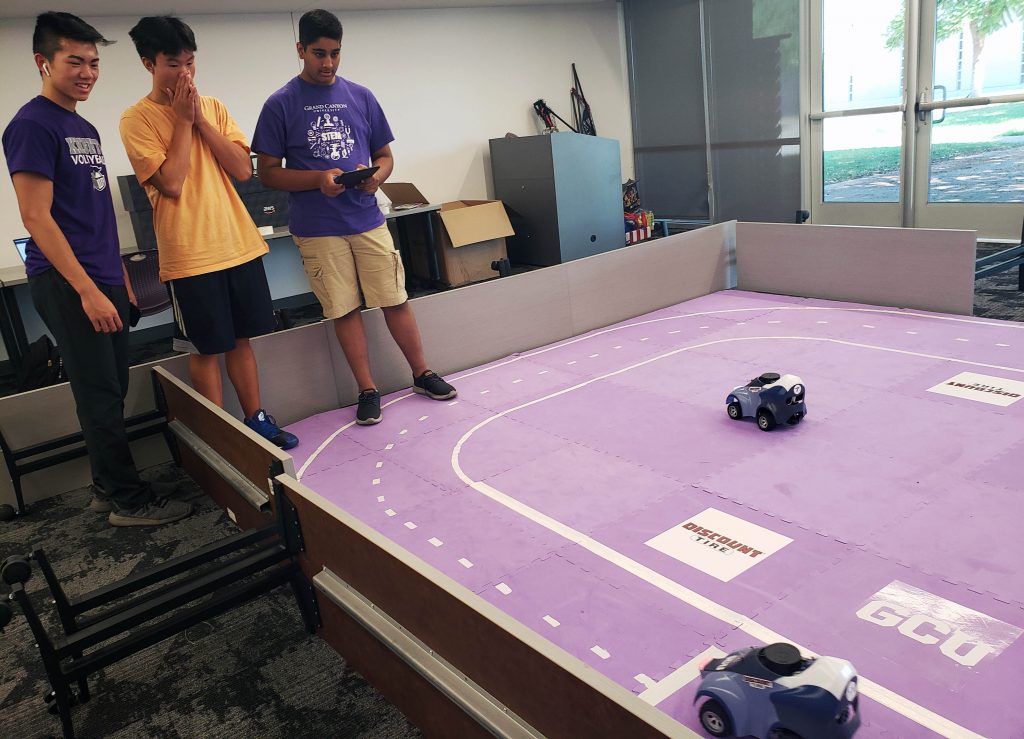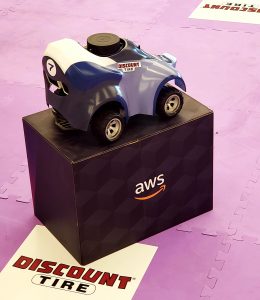
They’re zipping and hustling and moving and burning rubber, smoking the other racers and leaving them in the dust.
At least, that was the kind of race-car-driver glory Paradise Valley High School junior Atharva Goel and Arizona College Prep senior Kevin Chor imagined.
But it was less of the glory of zipping and hustling and moving and burning rubber on the track than it was the glory of learning and trouble-shooting their cars, two of 10 Amazon Web Services DeepRacers the Technology faculty purchased recently thanks to a $15,000 technology education contribution from industry partner Discount Tire.
The Grand Canyon University High School Summer STEM Internship scholars — they were two of about 24 interns on campus studying everything from biomedical engineering to exercise science — spent the summer anticipating the car race, which came to fruition recently in the Catalina classroom space adjacent to Sunset Auditorium and the Technology Building.

The 1/18th-scale race cars teach reinforcement learning, a type of machine learning in which developers train machines, such as the AWS racers, to make a sequence of decisions. In this case, Goel, Chor and the other artificial intelligence/machine learning interns are essentially teaching the cars how to drive autonomously, then racing them on a cloud-based 3D racing simulator before moving on to racing on a real-live track.
The cars drive autonomously using cameras to view the track and a reinforcement model that the students create and upload into the car. According to AWS, the car shows how a model trained in a simulated environment can be transferred to the real world.
“It (the technology) is exactly the basics of a Tesla car,” said Jevon Jackson, Program Chair and Program Lead of Software Engineering in the College of Science, Engineering and Technology.
The students have spent the past few weeks using programming language Python to “teach” the cars how to drive themselves.
It’s just one of the projects that unfurled as part of the High School Summer STEM Internships program, helmed by K12 Educational Development in partnership with the Honors College. In its second year at GCU, high school juniors and seniors in the program were imbedded with GCU professors and student mentors.
They were on campus five days a week and spent 100 to 200 hours during their internship, exploring science, technology, engineering and math disciplines and attending professional development sessions organized by the Honors College.

The AI/machine learning interns, in working with the AWS DeepRacers, were learning something fun but also highly challenging, said Jackson.
“It’s really, really complex,” Jackson said of reinforcement learning. “Imagine professional athletes, people who are seeing, in their mind, the buzzer-beaters in their head. It works in their mind, but then to put that into the actual game? That’s a one-in-a-million kind of chance that happens. You have to be extraordinarily good and actually physically practice that shot.
“That’s exactly what machine learning is. It’s done in the brain already — in the computer system. Then we take that and we’re trying to train the hardware components (in the cars) to function the way the brain says it should. It’s like a baby learning to learn and has to do that a lot of times to self-correct.”
And there was a bit of self-correcting going on at the purple racetrack as Goen and Chor tried to solve why their AWS DeepRacers did not make the turns on the track as they should. Meanwhile, the DeepRacer of AI/machine learning intern Stefanie Fan, a junior at Desert Vista High School, zipped around the track perfectly, at least twice.
It’s a scene Jackson expects to be repeated during the year as GCU students take their turn programming the autonomous model cars.
The AWS DeepRacers are just a sneak peek into what’s ahead for the college’s Technology Department. The process has begun to add an AI emphasis to the software engineering master’s degree program, something Jackson expects will happen a couple of years from now. The college also hopes to add an AI emphasis to the bachelor’s degree program.
Head of Technology Programs Rob Loy said the Technology Department also will helm a high school AWS DeepRacer competition. GCU students and faculty will mentor high school students to train their cars virtually and, in the spring, they will come to campus, upload their model into the cars and race them physically on the track.
"I think today has been the most frustrating and the most fun day. That's part of how machine learning works. I think it's really cool to learn how reinforcement learning works and how these machines can learn themselves, just through trial and error."
Atharva Goel, GCU High School Summer STEM Intern
The high school AWS DeepRacer program will be tied to the International Christian STEM Competition in the spring, which GCU organizes in partnership with the Association of Christian Schools International.
“We’re learning a lot this summer, thanks to our high school interns, on how things work or don’t work — things we need to fix, like we identified the track might not be the right kind of track,” Loy said of the GCU-themed purple track.
He and Jackson suspect they may need a darker-colored track, perhaps black, to contrast against the white barrier lines and other road surface markings so the cars’ cameras can better detect those markings.
Goel, who knew a bit of Python before starting his summer internship, said transferring his model from the virtual to the physical track has been the most challenging part of his internship so far.
“I think today has been the most frustrating and the most fun day,” he said as he watched his DeepRacer crash into the wall a few times because it didn’t turn like he wanted it to. “That’s part of how machine learning works. I think it’s really cool to learn how reinforcement learning works and how these machines can learn themselves, just through trial and error.”
Chor, who knew “almost nothing” about AI and machine learning, said autonomous cars are the future, and being able to delve into that technology keeps him relevant.
“Uploading into the physical car and seeing it move? It feels good,” he said.
Students had only worked on their AWS DeepRacer models for about two weeks before they put their learning into action.
To see what they accomplished in that small window of time is “so impressive,” Jackson said: “I’m proud of them.”
GCU senior writer Lana Sweeten-Shults can be reached at [email protected] or at 602-639-7901.















